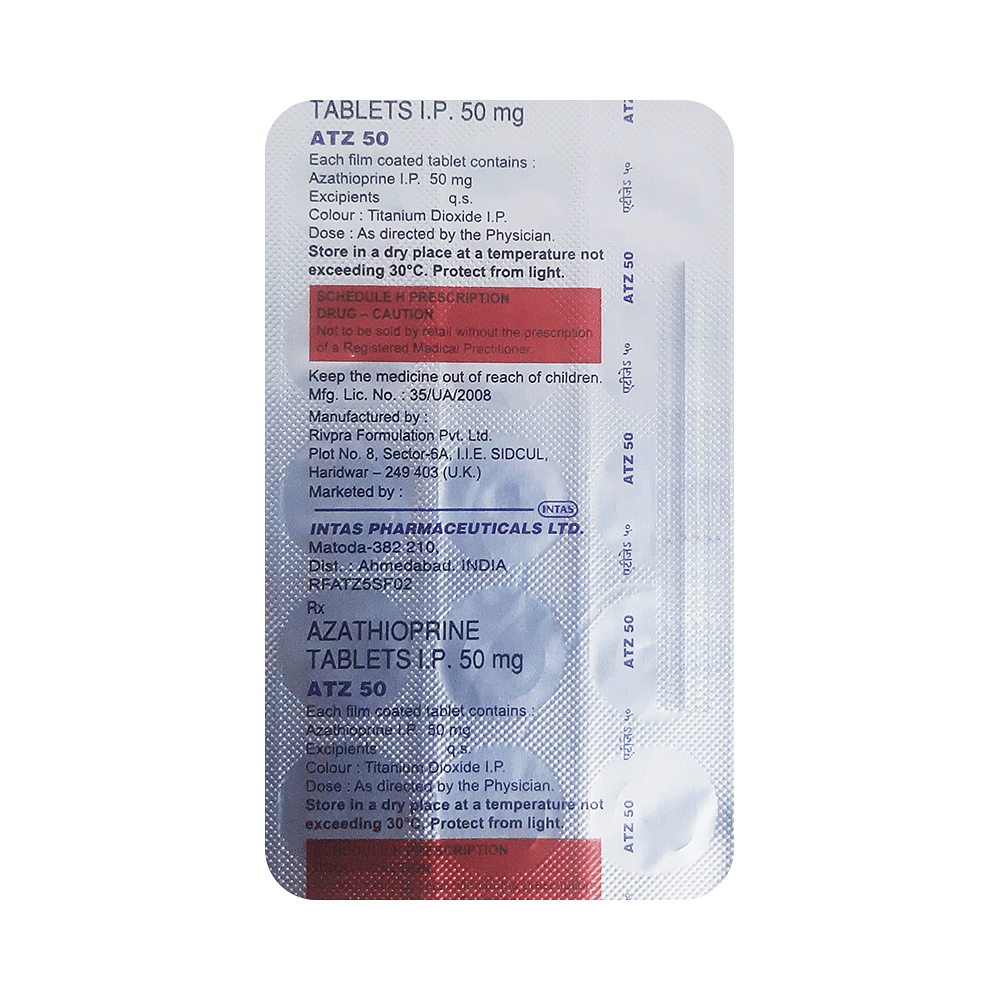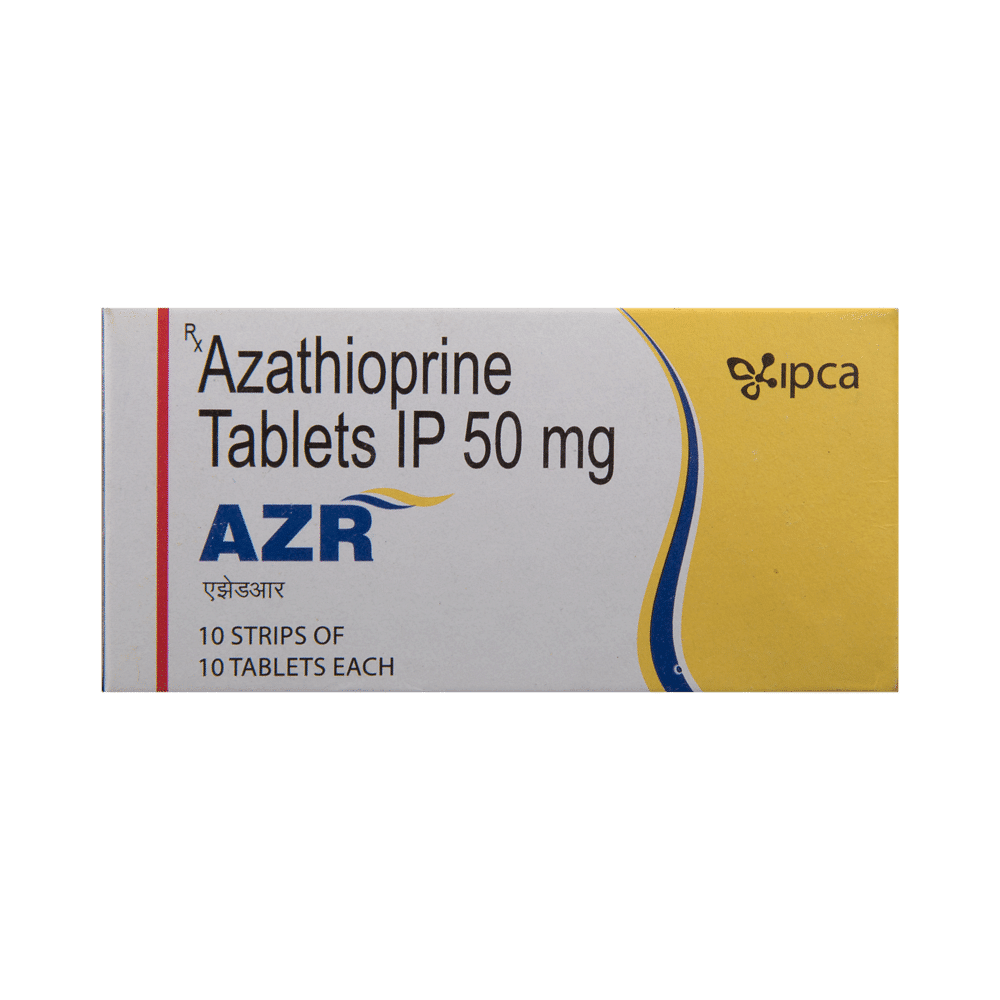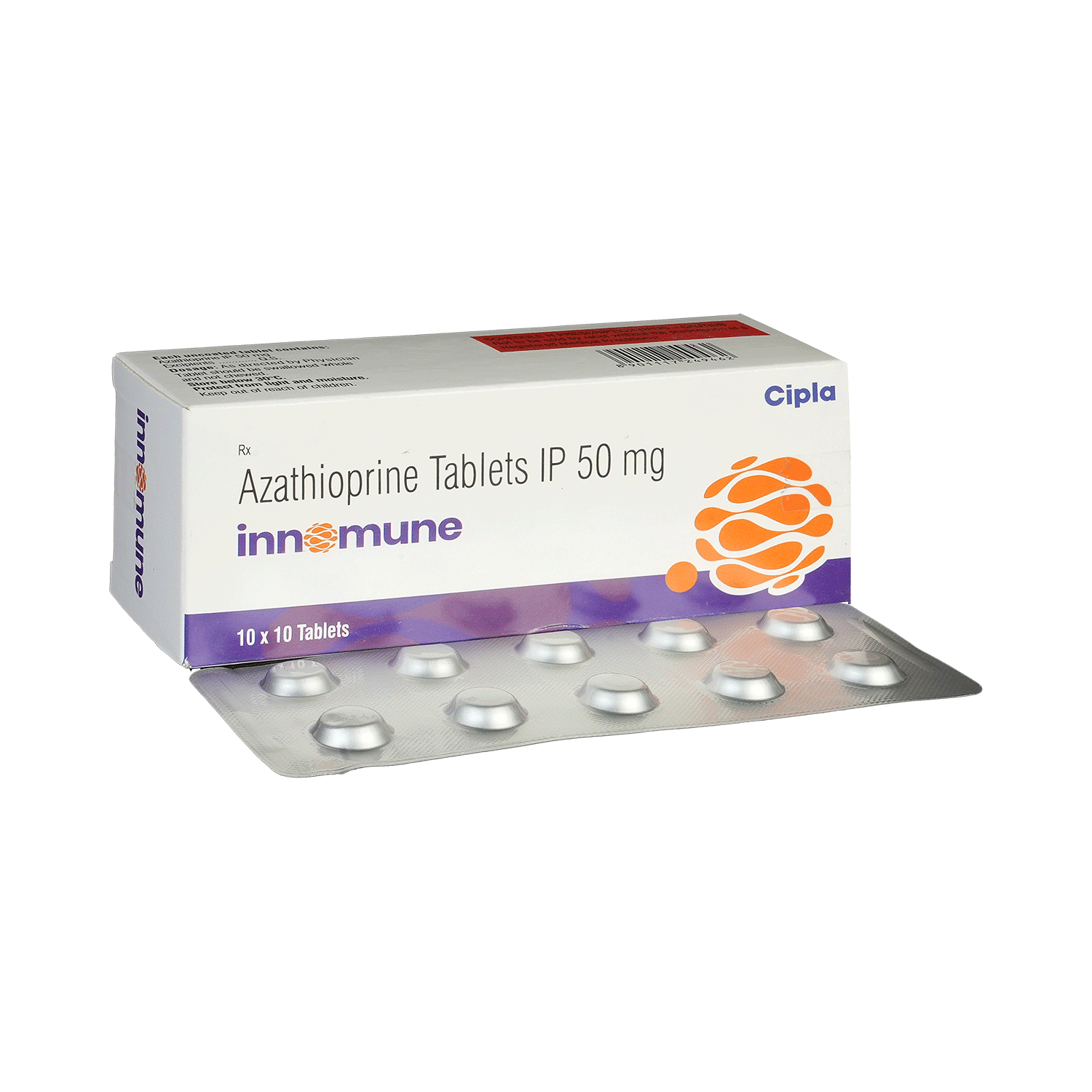
Azoprim Tablet
Manufacturer
Nidus Pharma Pvt Ltd
Salt Composition
Azathioprine (50mg)
Key Information
Short Description
Azoprim Tablet is an immunosuppressant used to prevent organ rejection after transplant and treat rheumatoid arthritis.
Dosage Form
Tablet
Introduction
Azoprim Tablet works by weakening the body’s immune system so it does not attack the new organ. The amount of medicine to be taken and how often you need to take it will depend on the type of transplant you have. Follow your doctor’s instructions on this. You should take it along with food. Take the medicine regularly to get the most benefit and keep taking it even if you feel well. If you stop taking it, you may increase the chances of rejecting your transplanted organ.
Directions for Use
Take this medicine in the dose and duration as advised by your doctor. Swallow it as a whole. Do not chew, crush or break it. Azoprim Tablet is to be taken with food.
How it works
Azoprim Tablet is an immunosuppressant. It reduces the action of body's own defense system (the immune system) and prevents rejection of the transplanted organ. It also blocks the action of certain chemical messengers that are responsible for inflammation, swelling, and redness associated with certain joint diseases.
Quick Tips
Your doctor has prescribed Azoprim Tablet to stop the body from rejecting a transplanted organ (e.g. kidney, heart or liver). Azoprim Tablet also relieves joint pain and inflammation in rheumatoid arthritis. You may have to take additional medications along with Azoprim Tablet for better relief of symptoms. Avoid contact with people who have cold, flu or other contagious illness. Inform your doctor if you are pregnant or planning to conceive or breastfeeding.
Related Medicines

Azoran 50 Tablet

ATZ 50 Tablet

Azoth 50 Tablet

Azafly 50mg Tablet

Azazin 50mg Tablet

AZR Tablet

Azotrim 50mg Tablet

Aparin 50mg Tablet

Innomune Tablet

Azathiol 50mg Tablet
Frequently asked questions
What is Azoprim Tablet prescribed for? How does it work?
Azoprim Tablet is an immunosuppressant medication. It works by suppressing the body's immune system, which helps protect against infections. Sometimes, the immune system can become overactive and cause illness. Azoprim Tablet is used in combination with other medications to treat conditions caused by this abnormal immune system activity. It is used for organ rejection prevention (such as kidney, heart, or liver transplants). It is also used to treat chronic active hepatitis, severe rheumatoid arthritis, systemic lupus erythematosus (SLE), idiopathic thrombocytopenic purpura, and acquired hemolytic anemia. It is also used to treat severe cases of specified skin diseases like pemphigus vulgaris, dermatomyositis, polyarteritis nodosa, pyoderma gangrenosa. It can be especially helpful when corticosteroids cannot be used.
How long does Azoprim Tablet take to start working?
It may take 3 to 12 weeks before you notice any benefits from Azoprim Tablet. It's important to continue the medication even if you don’t immediately see results. If you have concerns, talk to your doctor.
What happens if I forget to take Azoprim Tablet?
If you miss a dose of Azoprim Tablet, take it as soon as you remember. However, skip the missed dose if it's time for your next dose. Do not try to make up for missed doses by taking an extra one. If you frequently miss doses, let your doctor know.
How long do I need to take Azoprim Tablet?
The duration of treatment varies depending on the patient's condition, as it is prescribed by your healthcare provider.
Is breastfeeding safe during Azoprim Tablet treatment?
No, breastfeeding should be avoided while taking Azoprim Tablet because it may harm the baby and cause serious side effects.
I have just started taking Azoprim Tablet. What are the long-term side effects? Is there anything I should be looking out for?
Being an immunosuppressant, Azoprim Tablet increases the risk of severe infections, blood cell counts decrease, and malignancy. It is important to inform your doctor immediately if you experience any: - Infections or fever; - Unexpected bruising or bleeding; - Black tarry stools or blood in the urine or stool; - New skin sores or lumps; - New marks on your skin, or any change in marks that were previously present.
Do I need any special tests while I am on Azoprim Tablet?
Azoprim Tablet can lead to reduced blood cell counts, making you more vulnerable to infections and potentially affecting the liver. These side effects can be monitored through regular blood tests. Your doctor may recommend weekly blood tests during the first 8 weeks of treatment to monitor complete blood counts, including platelet counts. The frequency of testing can later be adjusted to monthly or at least once every three months.
Can Azoprim Tablet cause cancer?
Azoprim Tablet may increase the risk of developing certain cancers, like skin cancer, lymphomas, soft tissue sarcomas, and cervical cancer. To lower the risk of skin cancer, avoid prolonged sun exposure and wear protective clothing such as sunglasses, sunscreen, and protective clothing.
Can cyclosporine and Azoprim Tablet be taken together?
Yes, you can take cyclosporine and Azoprim Tablet together. However, it is crucial to take these medications as prescribed by your doctor.


